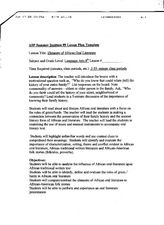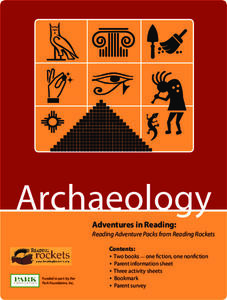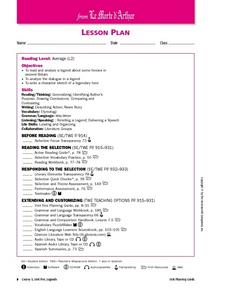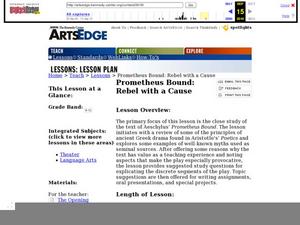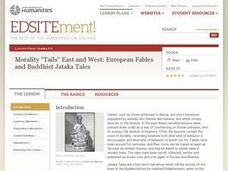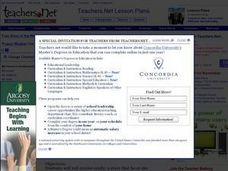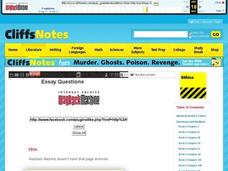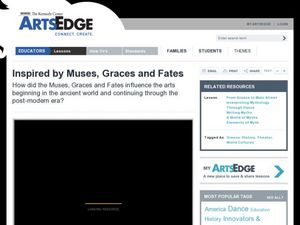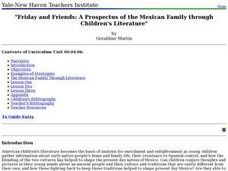Curated OER
Mythology and Ancient Civilizations
Third graders examine ancient world civilizations and the mythologies they created to explain natural phenomena, as well as the writers and poets who wrote about the mythologies.
Curated OER
The History of Writing
The history of written communication can be an interesting addition to history lessons.
Curated OER
Elements of African Oral Literature
Ninth graders examine the importance of family history. For this Language Arts lesson, 9th graders read and discuss African oral literature with a focus on the roles of griots. Students compare /contrast the elements of...
PBS
Reading Adventure Pack: Archaeology
Readings of fiction and nonfiction texts followed by a series of activities put scholars in an archaeologist's shoes. Learners read two texts, Archaeologists Dig for Clues by Kate Duke and The Shipwrecked Sailor: An Egyptian Tale with...
Curated OER
Glencoe Literature Themes: Legends
Students prepare for and respond to literature selections. This package includes five lessons from the Glencoe Literature series, each covering a different reading selection. Pre-reading and response activities are included for each...
Curated OER
Animals in Ancient Rome (Grades 7-8)
Young scholars explore the role of animals in ancient Rome through the interpretation of a fictional account.
Curated OER
Secrets of the Parthenon
Students take a closer look at the Parthenon. In this world monument lesson, students watch PBS video segments about the reconstruction of the Parthenon in Greece. Students research how the ancient Greeks built the structure and discuss...
Curated OER
Prometheus Bound: Rebel with a Cause
If you are teaching Aeschylus' Prometheus Bound, you can't afford to miss this source. An extensive list of ideas outlines numerous discussion topics, writing prompts, comprehension questions, oral presentations, and projects. Have class...
Curated OER
Morality "Tails" East and West: European Fables and Buddhist Jataka Tales
Have your class explore Buddhist Jataka Tales to compare and contrast them to European fables. After defining fables, Jataka tales, and the elements of each, learners identify themes and patterns for both types of narratives and the...
Curated OER
Storytellers Past and Present
Students read and discuss an article about Olga Loya, a modern storyteller. They watch a videotaped performance of a story and then create a storytelling experience for a story of their choice to share with the class.
Curated OER
Legends as Oral History
Sixth graders read First Nations legends to find information about the First Nations. In this legends as oral history lesson plan, 6th graders interview and write oral histories from family members.
Curated OER
Day Ten Lesson- The Whale Rider
Readers respond to Chapters 17 and 18 of Whale Rider by Witi Ihimaera. Working in literature groups, they identify the climactic elements in the chapters, discussing the text and making inferences based on their reading.
Curated OER
Credit as Currency: Ancient World History
Pupils examine use and principles of currency as it relates to the establishment and continuation of credit and banking systems.
Curated OER
Ethics - Essay Questions
In this literature activity, learners respond to 21 short answer and essay questions about Aristotle's Ethics. Students may also link to an online interactive quiz on the novel at the bottom of the page.
Curated OER
Rudyard Kipling's "Rikki-Tikki-Tavi": Mixing Fact and Fiction
"Rikki-Tikki-Tavi," from The Jungle Book, offers young readers a chance to examine how Rudyard Kipling uses setting and personification to bring to life the brave mongoose who battles cobras to protect his family. Class members...
Curated OER
Italian Renaissance
Fifth graders explore the Italian Rensissance in this six lessons unit. The prominent citizens, the ideas, values, art, philosophy, and literature of the are seen as a rediscovery of Ancient Greek and Roman times.
Curated OER
The Warrior Role in Greek Society
Students are introduced to the various gods and goddesses in ancient Greek mythology. In groups, they use print and electronic resources to research the ways Greek culture has influenced the modern world. To end the lesson, they...
Curated OER
Inspired by Muses, Graces and Fates
Students examine how artists express the Muses through the arts. For this art and history lesson, students work cooperatively to identify the Greek Muses, Graces and the Fates. Students will identify the attributes of each, participate...
Curated OER
Natural Enemies
Fourth graders engage in the reading of an ancient Chinese fairy tale. The goal of the lesson is for them to become creative in the use of writing. The story creates a context for student's writing and ideas for future drafts.
Curated OER
Friday and Friends: A Prospectus of the Mexican Family through Children's Literature
Students use literature to examine how the structure of families in Mexico has changed over time. In groups, they examine how their life now relates to their ancestors and the Spanish conquest of the area. As a class, they are read...
Curated OER
American Families: Portraits of African-American Families
Students develop a greater understanding and appreciation for their families. They increase personal self-esteem and pride as a result of studying about families through literature. They assess the importance of family values and...
Curated OER
Referencing the Classical Past
Students explore the concept of myths conveyed through art. In this art history lesson plan, students examine "Three Goddesses" and discuss the state of the world at the time that Nollekens created the sculptures as they analyze the...
Curated OER
Lions at Lunchtime
For this literature study unit, 4th graders read the book Lions at Lunchtime and match ten vocabulary words to the definitions and seven short answer questions based on chapters 1 and 2. Students read chapters 3,4, and 5 and answer...
Curated OER
Elements of Myth
Students read and act out myths. In this world mythology lesson, students read and analyze myths from various cultures and then recognize their attributes as they prepare presentations of myths that explain natural phenomena.




